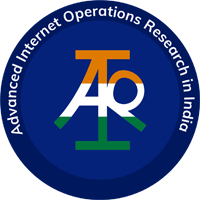The advent of quantum computing poses significant challenges to traditional cryptographic systems, including DNS Security Extensions (DNSSEC). DNSSEC is a suite of extensions to DNS that adds security by enabling DNS responses to be authenticated. However, the cryptographic algorithms that underpin DNSSEC are vulnerable to the computational power of quantum computers. In this blog, we will explore the impact of quantum cryptography on DNSSEC, the need for post-quantum cryptography (PQC) algorithms, and the research work of AIORI (Advanced Internet Operations Research in India) on developing a PQC testbed.
DNSSEC
DNSSEC adds an extra layer of security to the Domain Name System (DNS) by using digital signatures to ensure that DNS data is not tampered with. It relies on cryptographic algorithms such as RSA and ECC (Elliptic Curve Cryptography) to sign DNS records. While effective against classical threats, these algorithms are vulnerable to the capabilities of quantum computers.
The Threat because of Quantum Computing Innovation
Quantum computers leverage the principles of quantum mechanics to process information in fundamentally different ways compared to classical computers. Algorithms like Shor’s algorithm can efficiently factorize large integers, breaking the security of RSA and ECC. This means that once sufficiently powerful quantum computers become available, they could potentially decrypt data protected by these algorithms, undermining DNSSEC’s security.
The Need for Post-Quantum Cryptography
Post-quantum cryptography (PQC) refers to cryptographic algorithms that are designed to be secure against quantum computing attacks. Unlike classical cryptographic methods, PQC algorithms are based on mathematical problems that are hard for both classical and quantum computers to solve. The transition to PQC is essential to ensure the long-term security of DNSSEC and other critical internet infrastructure.
Key Post-Quantum Cryptography Algorithms
Several promising PQC algorithms have been proposed and are currently being evaluated by the National Institute of Standards and Technology (NIST). These include:
- Lattice-based Cryptography: Based on the hardness of lattice problems, which are believed to be secure against quantum attacks.
- Hash-based Cryptography: Uses hash functions to provide security, suitable for digital signatures.
- Code-based Cryptography: Relies on the difficulty of decoding random linear codes.
- Multivariate-quadratic-equations Cryptography: Based on solving systems of multivariate quadratic equations over finite fields.
AIORI’s Work on PQC Testbed
Advanced Internet Operations Research in India (AIORI) project is developing a testbed to evaluate and integrate post-quantum cryptographic algorithms into existing Internet infrastructure, including DNSSEC.
Objectives of AIORI’s PQC Testbed
- Evaluation of PQC Algorithms: Assessing the performance, security, and practicality of various PQC algorithms in real-world scenarios.
- Integration with DNSSEC: Developing and testing methods to seamlessly integrate PQC algorithms into DNSSEC to ensure future-proof security.
- Interoperability Testing: Ensuring that PQC-enhanced DNSSEC can operate alongside existing cryptographic systems during the transition period.
- Performance Optimization: Identifying and addressing performance bottlenecks associated with PQC algorithms to ensure they can be deployed at scale without significant impact on system efficiency.
- Collaboration and Standardization: Working with global Internet governance bodies and standardization organizations to promote the adoption of PQC standards.
Why Post-Quantum Cryptography is the Way Forward
- Future-Proof Security: PQC algorithms are designed to withstand attacks from both classical and quantum computers, ensuring long-term data security.
- Smooth Transition: Integrating PQC into existing systems allows for a gradual transition, maintaining security while quantum technologies evolve.
- Standardization and Adoption: The ongoing work by NIST and other organizations to standardize PQC algorithms provides a clear path for widespread adoption.
- Collaborative Efforts: Initiatives like AIORI’s PQC testbed are crucial for developing practical, deployable solutions and fostering collaboration across the global research community.
The potential of quantum computing to break existing cryptographic systems, including DNSSEC, necessitates the transition to post-quantum cryptography. PQC offers robust solutions that are secure against the capabilities of quantum computers, ensuring the continued protection of critical internet infrastructure. AIORI’s efforts in developing a PQC testbed represent a significant step towards integrating these new cryptographic methods, providing a blueprint for a secure and quantum-resistant future.
As the world prepares for the quantum era, the collaborative efforts of researchers, organizations, and governments will be essential in ensuring a smooth transition and maintaining the security and integrity of our digital world.
Author
-

I’m a tech entrepreneur and researcher who thrives on pushing boundaries and finding innovative solutions in the ever-evolving digital landscape. Currently, I’m deeply immersed in the fascinating realm of Internet resiliency, harnessing my expertise to ensure a robust and secure online space for all. 🚀
View all posts


